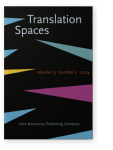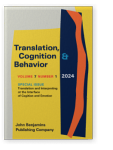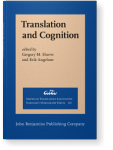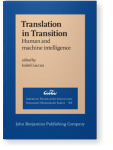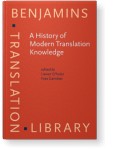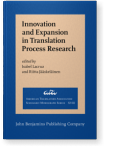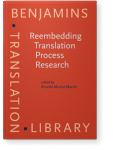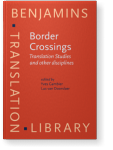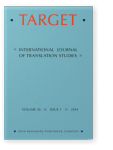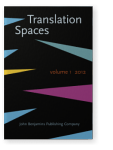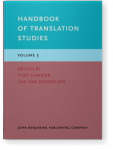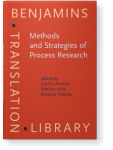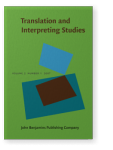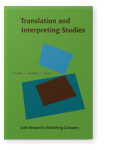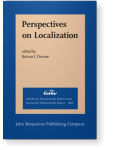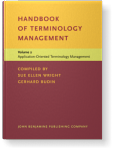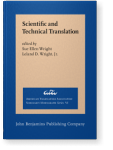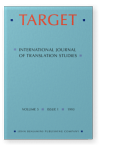Gregory M. Shreve
List of John Benjamins publications for which Gregory M. Shreve plays a role.
Journals
ISSN 2542-5277 | E-ISSN 2542-5285
Title
Translation and Cognition
Edited by Gregory M. Shreve and Erik Angelone
[American Translators Association Scholarly Monograph Series, XV] 2010. vi, 381 pp.
Subjects Cognition and language | Interpreting | Psycholinguistics | Translation Studies
2023 Chapter 2. The strange attractions of translation: Performance, expertise, and complexity Translation in Transition: Human and machine intelligence, Lacruz, Isabel (ed.), pp. 15–38 | Chapter
The complex-adaptive systems model is useful for understanding translational behavior and cognition in a way that unites our discipline with others (economics, biology, psychology) investigating complex, non-linear, dynamical, and adaptive systems. We can recast some conceptions of the… read more
2018 Chapter 6.4. Cognitive research A History of Modern Translation Knowledge: Sources, concepts, effects, D’hulst, Lieven and Yves Gambier (eds.), pp. 385–387 | Chapter
2018 Chapter 3. Are expertise and translation competence the same? Psychological reality and the theoretical status of competence Innovation and Expansion in Translation Process Research, Lacruz, Isabel and Riitta Jääskeläinen (eds.), pp. 37–54 | Chapter
Translation competence has long been a staple fundamental concept in translation studies. In this paper, we argue that it is perhaps time to reconsider the need for this notion, at least in cognitive translation studies, where the concept of expertise could be a robust and more enlightening… read more
2016 Match evaluation and over-editing in a translation memory environment Reembedding Translation Process Research, Muñoz Martín, Ricardo (ed.), pp. 131–148 | Article
Computer-assisted translation (CAT) has been touted as a means of increasing translator productivity and improving translation quality while decreasing the amount of effort required to complete certain translation and localization tasks. Translation memory (TM) tools are among the most prevalent in… read more
2016 Cognitive neurosciences and cognitive translation studies: About the information processing paradigm Border Crossings: Translation Studies and other disciplines, Gambier, Yves and Luc van Doorslaer (eds.), pp. 141–168 | Article
Cognitive translation studies has made great strides in recent decades. The
discipline has engaged more deeply with the cognitive sciences, integrating the
study of mental processes into its understanding of the translation task. The
information processing paradigm has been a mainstay of the… read more
2014 Measuring translation difficulty: An empirical study Target 26:1, pp. 98–127 | Article
The purpose of this study was to find a method to measure difficulty in a translation task. Readability formulas have been suggested to be a useful tool and yet this needs to be empirically tested. In this study, NASA Task Load Index, a multidimensional scale for measuring mental workload, was used… read more
2012 Introduction Translation Spaces 1, pp. 1–4 | Article
2012 Bilingualism and translation Handbook of Translation Studies: Volume 3, Gambier, Yves and Luc van Doorslaer (eds.), pp. 1–6 | Article
2011 Sight translation and speech disfluency: Performance analysis as a window to cognitive translation processes Methods and Strategies of Process Research: Integrative approaches in Translation Studies, Alvstad, Cecilia, Adelina Hild and Elisabet Tiselius (eds.), pp. 93–120 | Article
Written and sight translation share a comprehension component centered on written input. In sight translation, because of production constraints, the cognitive effort expended in a given span of time is greater than in written translation. Comprehension, transfer, and production processes occur in… read more
2010 Neural and physiological correlates of translation and interpreting
in the bilingual brain: Recent perspectives Translation and Cognition, Shreve, Gregory M. and Erik Angelone (eds.), pp. 289–321 | Article
In translation studies, there has been a significant increase in the range of methodologies used to examine the cognitive processes underlying translation and interpreting and determine how and where these processes are represented in the brain. Some recent data gathering tools, such as… read more
2010 Translation and cognition: Recent developments Translation and Cognition, Shreve, Gregory M. and Erik Angelone (eds.), pp. 1–13 | Article
2010 Cognitive effort, syntactic disruption, and visual interference
in a sight translation task Translation and Cognition, Shreve, Gregory M. and Erik Angelone (eds.), pp. 63–84 | Article
Due to limits on the reallocation of cognitive effort during sight translation, comprehension problems are likely to be more disruptive than they would be in written translation. Eye movements during the processing of “disrupted” experimental texts should reveal important information about the… read more
2007 Future directions in empirical research: An interview Translation and Interpreting Studies 2:1, pp. 191–204 | Article
2006 Integration of translation and summarization processes in summary translation Translation and Interpreting Studies 1:1, pp. 87–109 | Article
"Summary translation" is a form of translation that is much more common in the federal government than in commercial environments, and so is rarely studied and generally ill understood. While it involves many of the processes that emerge in the nor-mal full translation task (verbatim translation in… read more
2006 Corpus enhancement and computer-assisted localization and translation Perspectives on Localization, Dunne, Keiran J. (ed.), pp. 309–331 | Article
2001 8.4.3 Terminological Aspects of Text Production Handbook of Terminology Management: Volume 2: Application-Oriented Terminology Management, Wright, Sue Ellen and Gerhard Budin (comps.), pp. 772–787 | Article
1993 The standard generalized markup (SGML) heuristic textual resources in translation-oriented databases Scientific and Technical Translation, Wright, Sue Ellen and Leland D. Wright, Jr. (eds.), pp. 185–208 | Article
1993 Is There a Special Kind of “Reading” for Translation? An Empirical Investigation of Reading in the Translation Process Target 5:1, pp. 21–41 | Article
The role of reading in translation is rarely discussed in the literature. Translation has mainly been discussed within a product-oriented framework. The more process-oriented approaches of recent years have taken notice of reading as a component activity of the translation process. However, few… read more
